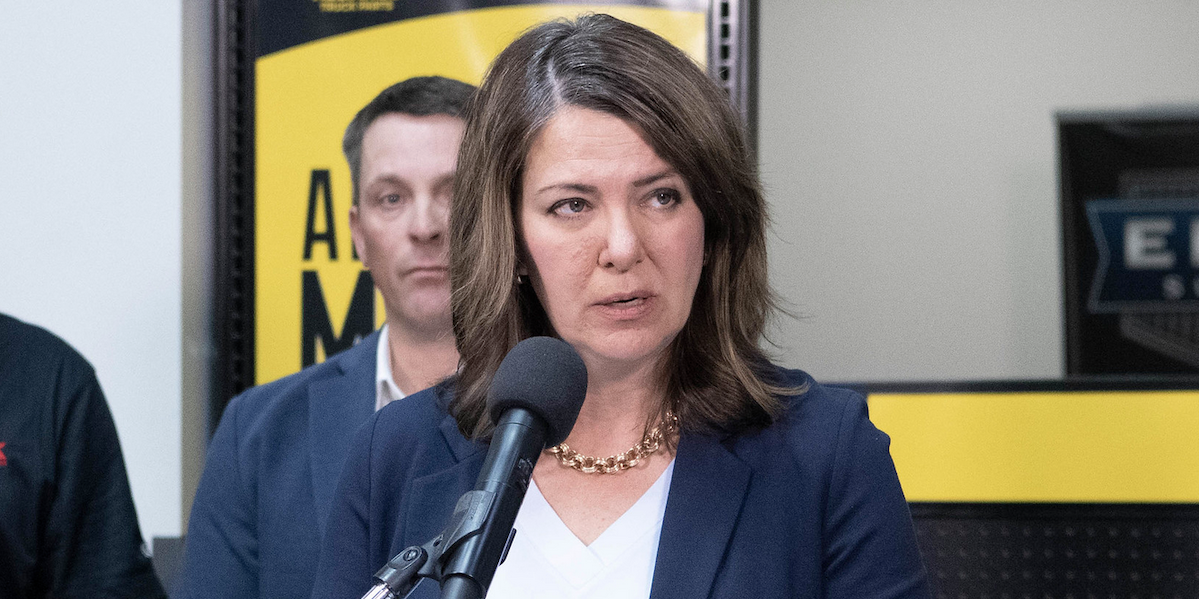Alberta Premier Danielle Smith confirmed Saturday she’s about to use her Alberta Sovereignty Act – the clearly unconstitutional legislation that even her United Conservative Party (UCP) predecessor Jason Kenney called “a full-frontal attack on the rule of law.”
“A government that pretends it can, at will, set aside any court decision, ignore the Constitution, is deciding to deliberately undermine the rule of law,” Kenney explained, shortly before he left office in the fall of 2022.
Warning that implementation of the act could turn the province into a “banana republic,” he said “the so-called Sovereignty Act would effectively bring us to the brink of separation from Canada.”
The legislation has since been misleadingly renamed the Sovereignty Within a United Canada Act, but that changes neither the character of the law nor the former premier’s not unreasonable assessment of its dangers.
Premier Smith now proposes to employ her signature legislation to “protect” Alberta from the federal government’s draft clean energy regulations, which would not come into effect until 2035, the CBC reported on Friday.
The UCP Government will use the Sovereignty Act to introduce a resolution in the Legislature to declare Ottawa’s plan to reduce electricity grid emissions to be unconstitutional, the CBC said.
That, obviously, is the unconstitutional part of the Alberta law. There is only one way in Canada to settle a federal-provincial jurisdictional dispute, and that is through the courts – hence Kenney’s justified concern about his own party’s growing disdain for the rule of law.
Passing a bill that says the Alberta Legislature need not go to court to overturn a federal law a majority of MLAs don’t like, doesn’t make it so, as I am sure Smith and her sovereigntist advisors well know. Alas, we are all obligated to obey laws we don’t like.
The UCP is going to do it anyway in the expectation Ottawa will have to challenge the legislation in court and the hope that will provoke a constitutional crisis, as advocated by political scientist Barry Cooper. Dr. Cooper, with Rob Anderson, the Director of the Premier’s Office, authored the Free Alberta Strategy, the separatist screed that now appears to be driving UCP policy.
Channelling Depression-era Alberta premier William Aberhart in both medium and message, Smith took to the radio to sketch out her plans.
Tossed a softball question about the CBC report by the host of her free Saturday morning Corus Entertainment radio program, Your Province, Your Premier, Smith confirmed the story, but added that “people will have to wait until Monday to see the architecture of it.”
Claiming tendentiously that it’s federal Environment Minister Steven Guilbeault who lacks respect for the law and the constitution, Smith rambled on about how the feds have lost two constitutional court cases recently and therefore the Trudeau Government has strayed from its constitutional lane with its clean energy regulations.
This is typical of Smith’s gaslighting. While it is true that Alberta has enjoyed recent success in the courts, the prevailing opinion of the experts – as hated as experts may be by the UCP – is that last month’s Supreme Court ruling tossing out much of Canada’s environmental assessment law will have no impact on oilsands emissions caps or clean electricity regulations.
Stuart Elgie, a University of Ottawa law professor, observed at the time, “it will be an uphill fight for Alberta to challenge new greenhouse gas emission law, and (the Supreme Court) decision doesn’t change that.” Neither does the Alberta Sovereignty Act, it is said here.
It is certainly not true, as Smith asserted, that unlike Guilbeault, she does care about the law and the constitution. All the evidence would suggest the opposite.
After repeating her bold but questionable assertion Alberta simply cannot meet the federal clean electricity standards by 2035, Smith stated: “We have to have a reliable grid. We have to have an affordable grid. And we’re going to make sure that we’re going to defend our constitutional jurisdiction to do that.”
Smith also made a provocative statement about not wanting any electricity operator to have to go to jail for being “unable to achieve the unachievable” – an intentionally misleading reference to the fact refusing to obey federal law can be a criminal offence.
This, though, may explain why the Smith Government has chosen to apply its Sovereignty Act to an issue where revisions to the federal regulations are not complete and it will be almost a dozen years before they take effect.
No one will have to defy federal law and risk facing the consequences for more than a decade, by which time the matter will probably be resolved one way or another.
Still, jail time may enter this story at some point if the UCP Government continues down its present separatist path.
History doesn’t offer many examples of nation states that just cheerfully allow themselves to be dismantled. So if the current trustees of the UCP persist with this strategy, at least after Canada’s courts have had a chance to rule on the constitutionality of the Sovereignty Act, serious jail time for sedition can’t be ruled out.
Consider the case of Carles Puigdemont, the elected Catalonian separatist leader who provoked a constitutional crisis with Spain and found himself in 2017 facing a choice of 15 years in a Spanish jail for sedition or exile in Belgium. Puigdemont, arguably, was roughly the equivalent of a Canadian premier.
Reasonably enough, I suppose, Puigdemont chose Belgium, likely on the grounds the beer and chocolate there were bound to be better than in a Spanish prison. The charges have since been dropped. Nevertheless, his predicament is something to keep in mind.



